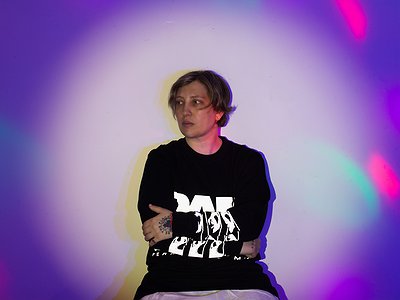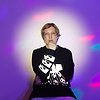How would you describe the relationship between your choices and goals as a DJ and the expectations, desires and feedback of the audience? Is there a sense of collaboration between you and the dancers?
I can’t do my job well unless there is a collaboration from the audience. The entire experience is based on how we connect with each other and the music.
I’ve had gigs throughout the years where I just couldn’t connect and tried literally everything. That’s the most awful and exhausting feeling as a DJ, but it’s a part of the job and you let it go and move on. I am very lucky that I’ve mostly played clubs and parties that have amazing crowds which allowed me to do what I do and be myself, and that’s always very rewarding and makes it all worth it.
In a song or classical composition, the building blocks are notes, but in a DJ set the building blocks are entire songs and their combinatory potential. Can you tell me a bit about how your work as a DJ has influenced your view of music, your way of listening and perhaps also, if applicable, your work as a producer?
DJing taught me to really hear every part of a track and know its’ value, and the importance of arrangement. You get a sense of how each sound belongs in a track and what feeling it can create. Something simple like a clap or hi hat can completely transform a room’s energy. Knowing this is of course is essential as a producer - especially if you’re creating music for dance floors.
Take us through a day in your life, from a possible morning routine through to your work, please. Do you have a fixed schedule? How do music and other aspects of your life feed back into each other - do you separate them or instead try to make them blend seamlessly?
For many years in my career I always had a second job just to get by, as especially in the US it’s really difficult to survive financially unless you want to take shitty gigs. We’re also conditioned from a young age that music is a hobby and we won’t survive without another job, so it took me a while to take the plunge even when I was able to support myself from just DJing.
I went full time in 2019, obviously not knowing Covid would happen. But I can honestly say, as much as this year was a shit show, I feel like I grew the most as a producer and made the best music of my life since quitting my day job.
It was the first time I had the time and head space to be fully creative and it made a world of difference in my output. For most of my career I worked on music after work or weekends or any free moments I had. I had to sacrifice a lot of normalcy to get it done, but I was happy to do it. Now I don’t really have a fixed schedule, but I’m definitely more creative in the morning so I try to start making music as soon as I get up.
I had periods where I would force myself to write every day, but I wasn’t really into that because I’m a super sensitive person and I have to be feeling creative when I’m making music or I’m not happy with the end result. Now I just try to sit down and write when I’m feeling it, and if it doesn’t work I take an ear break and try again the next day. Most of the tracks I've released came together in a day or two, it’s usually seamless or I start over.
It’s very hard for me to separate life from art, this year particularly because of everything that’s happened. I have worked through it, but I had months where I just didn’t feel creative at all and decided it’s more important to make sure I focus on feeling ok and getting through this period rather than worrying about being productive.
Can you talk about a breakthrough DJ set or performance in your career? Why does it feel special to you? When, why and how did you start working on it, what were some of the motivations and ideas behind it?
I don’t know if it was a breakthrough DJ set for me, but I can say it was a life changing DJ set for me when I played Panorama Bar for the second time in 2016. I remember it very well as it was a Sunday afternoon where everything just came together perfectly. I never had that kind of connection to a club or a crowd, it was really just pure magic. My best friend and label partner Shaun J. Wright was also playing that day and we had lots of friends in town and in the crowd. I also remember that it was right after Prince had passed so I closed with a Prince track and all the bar staff were dancing on the bar and everyone in the room was singing. I definitely teared up a few times that set. My friend took a voice recording of the room on the last song and played it for me the next day and I cried some more. It was one of the best moments of my life, and made all the years of work worth it.
I always prepare for a couple of weeks when I play Panorama Bar. I start buying music and organising it into folders way in advance. I think I put away at least 600 tracks for each set which is ridiculous, and then even more for the closing. I don’t ever plan sets, but I usually like to figure out my first 3 tracks at home in case I get nervous at the start but after that it’s just improvisation and reading the room.
Music and sounds can heal, but they can also hurt. Do you personally have experiences with either or both of these? Where do you personally see the biggest need and potential for music as a tool for healing?
Music is a magical universal language. You can be in a room full of people from all different backgrounds, which don’t speak the same language, and play a song and they will all feel it and react. It’s very powerful, there’s nothing really like it.
Songs can be attached to moments and memories and people. That can of course bring out different feelings, whether it’s healing or anything else depending on the person and situation. I can hear Nirvana and remember how I felt as a teenager, and where I was when Kurt Cobain died. I have “This Must Be The Place” (Talking Heads) tattoo’d on my hand because that song was playing at a wedding the day after my good friend suddenly died, and since that night it just happens to play at very specific moments in my life when something monumental is happening so I feel like someone is watching over me in the universe. The beauty of music is there is something for everyone and you can use it as you wish in your life, the possibilities are endless.
There is a fine line between cultural exchange and appropriation. What are your thoughts on the limits of copying, using cultural signs and symbols and the cultural/social/gender specificity of art?
I think there is a way to respectfully pay homage to your influences without copying or appropriating someone else’s culture/ideas/identity and not giving anything back or pretending it’s your own for personal gain. I think it’s vital to know the history of the music or art you are into and the scene you want to be part of, and to be respectful of the generations that came before you.
Art can be a purpose in its own right, but it can also directly feed back into everyday life, take on a social and political role and lead to more engagement. Can you describe your approach to art and being an artist?
My approach has always been very personal. Music has been there for me my entire life, it’s the only thing constant. I’ve met all of my friends through music. It’s shaped my entire life. It’s a part of me and who I am, I couldn’t survive without it. Once I accepted that in my life, my life got exponentially better.
What can music express about life and death which words alone may not?
Music can sometimes express our feelings beyond words. There are things I find it hard to talk about, but I could find you the perfect song for that moment and you would instantly feel what I’m feeling without having to say anything.



